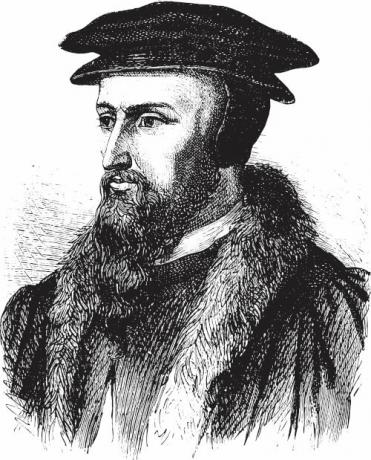O Calvinismwas a religious doctrine that emerged in Switzerland, right after the Protestant Reformation. Its founder, John Calvin, believed:
in predestination;
in valuing good customs; and
in defense of capital accumulation.
O favorable positioning for work and wealth it caused many European bourgeois to adhere to Calvinism. In five points, Calvin outlined the guidelines of the new doctrine, such as the thesis that God chooses those who will be saved and those who will be damned. Calvin's new ideas encouraged the formation of new churches around the world, such as the Presbyterian and the Reformed.
Read too: Council of Trent — steps taken by the Catholic Church to reaffirm its doctrine
History of Calvinism
Protestant Reformation
THE Protestant Reformation emerged in 1517, When Martin Luther questioned practices of the Catholic clergy that were not consistent with biblical teachings, such as charging for indulgence. That Luther's protesting gesture triggered, in various parts of Europe, other religious movements, which not only criticized the Catholic doctrine, but also opened space for the emergence of new Christian denominations through the world. Luther's translation of the Bible into German also allowed other people to have access to the Holy Scriptures and be able to interpret it. That
caused other leaders to elaborate their own religious doctrines. and originated different ways of reading the biblical text, without Vatican interference. Thus, several Christian churches emerged, which, in a short period of time, gained thousands of faithful and spread across the European continent. With this, the Catholic Church lost its hegemony over the Western Christian world.During this period, several national states were in formation, and the absolutist monarchs were beginning to reign over these new nations. The Protestant Reformation was a great catalyst for these kings to break ties with Catholicism and adhere to new religious doctrines whose ideas were better suited to their powers. To learn more about this milestone in the history of Christianity, read the text: Protestant Reformation.
Do not stop now... There's more after the advertising ;)
Historical context in Switzerland
Switzerland, at the end of the 15th century, dismembered from the Holy Germanic Empire and it became a kingdom in which commerce strengthened. The Swiss bourgeois were unhappy with the Catholic Church's prohibitions on usury, that is, the charging of interest. With the spread of the new religious doctrines, work and the accumulation of wealth ceased to be a sin, and the bourgeois quickly adhered to them.
In addition to commercial freedom, Switzerland became tolerant of new religious doctrines. After a civil war between Catholics and Protestants in 1531, the "Peace of Kappel" was signed, in which religious tolerance was established in Switzerland and the Protestantism could act freely. It was in this context of religious freedom that Calvinism emerged and established itself.
John Calvin and the Creation of Calvinism

The word Calvinism comes from John Calvin, a Frenchman born in 1509 and that, from an early age, he was interested in religion. At 18, he was already declared a Master of Theology. Between 1533 and 1534 he converted to Protestantism, but as in France, which was predominantly Catholic, there was no religious freedom. moved to Switzerland. This country was favorable for Calvin to dialogue with other Protestant religious.
Calvin presented predestination, that is, the belief that God, before creation, had already chosen who would be saved and who would be condemned. To know what was the divine decision, the believer should look for clues and live a correct life, based on good customs. For John Calvin, Christ's death on the cross was not to save all mankind, but God's elect from the beginning.
Calvino published his ideas in books. The most important is “The Institutes of the Reformed Religion”, published in 1536, which had an influence on the formation of the Reformed faith and on the expansion of Calvinism throughout Europe. THE foundation of the Geneva Academy it played a fundamental role in the formation of new Protestant reformers and in welcoming those who fled from other countries because of religious persecution. Calvin sought to reconcile the various strands of Protestantism, in order to unite the Protestant churches and their doctrines.
During the English Revolution, Calvinism played an important role, because the bourgeois who fought against the absolutist kings did not admit the prohibition of religious practices imposed by the Crown. Currently, Calvinism is present in several countries around the world. In Brazil, the doctrine arrived in the colonial period, but it only expanded in the late nineteenth century, with the Proclamation of the Republic and the guarantee of religious freedom.

Characteristics and Ideas of Calvinism
Calvinism is a religious doctrine, also called the Reformed faith. The central point of John Calvin's religious thought is predestination. The Calvinist believes that since the creation of the world, God established which individuals would be saved and which individuals would be damned. To know the pre-established destiny for his soul, the believer should look for clues and maintain a correct and obedient life to God. As Calvinists advocated a “pure life,” they were called Puritans.
Calvinist doctrine states that the individual can establish his own relationship with God, as long as his experience is based on purity and the practice of good customs. Calvin objected to the fact that the Catholic Church was the only way for the believer to relate to God. Every believer received a talent, a gift from God, and was to put his aptitude into development. Thus, Calvinism values work and its fruits, as capital accumulation.
THE bourgeoisie he embraced the reformed faith because of this valorization of work, contrary to what was seen in the Catholic Church, which was against usury. Max Weber, in his book “The Protestant Ethics and the Spirit of Capitalism”, analyzes the influence of the Reformed faith in the formation and expansion of the capitalism in Europe.
See too: Counter-Reformation - Catholic Church's reaction to the advance of Protestantism
The Five Points of Calvinism

The tulip became the symbol of the five points of Calvinist doctrine. Each initial of these dots corresponds to the letters of the flower's name in English: “tulip”.
- Total Depravity (Total Depravity): because of the original sin, that committed by Adam and Eve reported in the biblical book of Genesis, man is born bad under the influence of this sin. For him to do good, God's action is necessary.
- Unconditional Election (Unconditional Election): man's salvation does not depend on himself or on his good deeds. Who can save is God and he chooses who will be saved and who will be condemned. For Calvinists, this divine option may seem unfair, but since everyone was in sin and God chose some, according to doctrine, this would be fair.
- Limited Atonement (Limited Atonement): Jesus Christ's death on the cross did not mean the salvation of all mankind, but of the elect of God.
- Irresistible Grace (Irresistible Grace): The individual who has been chosen by God cannot deny His calling.
- Perseveranse of Saint (Perseverance of the Saints): by answering the call of God, man assumes his faith forever and, despite the difficulties, will remain firm in his belief.
Differences between Calvinism and Lutheranism
Despite Calvinism and the Lutheranism have arisen from the Protestant Reformation, there are some doctrinal differences between the two. The main difference is in salvation. While Lutherans believe that the faithful's faith and good works lead them to salvation, Calvinists consider salvation as something already accomplished and defined by God before the creation of the world.
Calvinists admit no intermediation between the believer and God, while Lutherans have among their members clerics and ministers with some religious powers within their rites. Another difference is in temporality: Lutheranism emerged in the first phase of the Protestant Reformation, and Calvinism was instituted in the next phase.
Summary on Calvinism
Calvinism is a religious doctrine created by John Calvin in 1536, which defends predestination, that is, that salvation has already been determined by God.
In addition to predestination, Calvinists believe that work should be valued as a gift from God, the good customs must be strictly followed, and the individual can have a proper relationship with God, without intermediaries.
What differentiates Calvinism and Lutheranism is salvation. While Calvinists regard salvation as something already determined by God, Lutherans believe that faith and good works open the way to the believer's salvation.
solved exercises
Question 1 - Soon after the Protestant Reformation, several religious doctrines emerged to criticize the teachings of the Catholic Church, reinterpreting the Bible or elaborating new teachings on the Christian faith. Calvinism was one of those doctrines that emerged in the 15th century. In this regard, it is correct to state that:
A) Calvinists believe that Mary, the mother of Jesus, is the only one who can mediate the faithful in relation to God, and no longer the Catholic Church.
B) when elaborating the new religious doctrine, John Calvin affirmed that work should be despised and that usury was a mortal sin.
C) the bourgeoisie adhered to Calvinism because of the valorization of work and the non-condemnation of usury.
D) the Lutherans, after the emergence of Calvinism, abandoned the entire doctrine elaborated by Martin Luther and adhered to the ideas of John Calvin.
Resolution
Alternative C. John Calvin criticized the Catholic Church's condemnation of usury. According to their doctrine, each individual received from God a gift, which had to be developed, so the work was valued by the Calvinists.
Question 2 - About the salvation of people, Calvinism affirms that God has already chosen who will be saved and who will be condemned, that is, each person's future has already been mapped out and cannot be changed. This theory, which is at the heart of Calvinist doctrine, is called:
A) Prosperity Theory.
B) Predestination Theory.
C) Annunciation Theory.
D) Theory of Revelation.
Resolution
Alternative B. According to Calvinism, the Theory of Predestination states that salvation and damnation were already established by God before creation. The death of Jesus Christ was not salvation for everyone, but only for the elect.
By Carlos César Higa
History teacher

